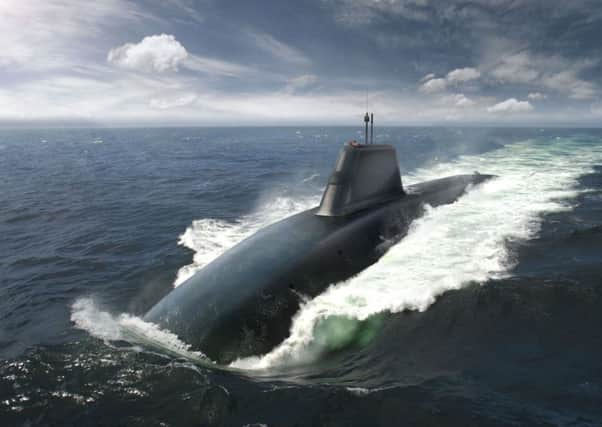Andrew Wilson: We must imagine non-nuclear life


Not strictly a scientific fact, I know, but it is what I say to my eight-year-old whenever the sheer unadulterated, unexpurgated, unfairness of life overwhelms him.
Managing our emotions and temper is one of the great challenges of maturation. Listening to the intuition of our emotions is a good thing, letting them dominate your thinking? Not so much.
Advertisement
Hide AdAdvertisement
Hide AdCato probably put it a touch better in ancient times: “An angry man opens his mouth and shuts his eyes.” Look around you. Too many eyes are closed to the realities of the world.
And what is true for the individual is equally true of the collective voice of society.
It is not always anger causing it. But for a variety of reasons we find the country’s collective eyes wide shut to many issues.
The most startling example is the position of many otherwise progressive people towards nuclear weapons and multilateral disarmament.
Otherwise engaged and informed individuals with a progressive view of the world can take an apparently irrational view. If “irrational” is unfair then perhaps I mean that their world view can be based on profoundly dubious foundation principles or at least not properly thought through.
To some, it is evidently all about jobs. This is odd. If you gave me £100 billion to spend, I could create many more jobs than the nuclear weapons base at Faslane sustains. And anyway, the same people who say they want weapons for jobs also say that they are in favour of multilateral disarmament – the UK getting rid of its weapons in agreement with other states – they just don’t say when. So it can’t be about jobs and if it is, then it’s a very poor job creation scheme.
So before we get to the pragmatism of “how” let’s consider first principles. Biological weapons were outlawed by the international community in 1972. Chemical weapons followed in 1993. Good. Both are foul and inhuman, hence the agreement to ban them. The human impact of nuclear weapons is as bad or worse in scale. Therefore on the same logic should they be banned? Yes, of course. But we cannot wish them away – we have to act, with purpose.
As long ago as January 2009, senior retired military leaders Field Marshal Lord Bramall and Generals Lord Ramsbotham and Sir Hugh Beach denounced Trident nuclear weapons as “irrelevant”. They argued they were neither a deterrent nor independent and, instead of renewal, funding should be focused on equipping our forces to cope with the actual challenges they faced.
Advertisement
Hide AdAdvertisement
Hide AdAnd yet otherwise progressive voices remain silent or, worse still, supportive of our own vertical proliferation. It is bemusing.
So what will it take for minds to awaken and action to be taken? Initiative. As apartheid fell and Nelson Mandela walked out of his prison, South Africa scrapped its nuclear arsenal and ballistic missiles. Did that damage their security? No. Did it damage their standing and influence?
Senior Conservative party politicians have argued yes, but it seems nearly impossible to sustain an argument that the apartheid regime had greater pull in the world than Nelson Mandela did afterwards. But that hasn’t stopped them trying.
For Scotland, the non-renewal of Trident is a no-brainer. For the UK it really is too, on the grounds of both principle and finance. We could kick-start the process of wider disarmament and set goals that might one day be reached rather than sign commitments and treaties we self-evidently never intend to fulfil.
The argument of deterrence grew up in an era of cold war, when two superpowers faced off backed by colossal stockpiles of weaponry. It never made much sense then, but it makes absolutely no sense now.
If the entire arsenal of the G8 is not a response to worries about each other then there are surely better ways – military, economic and diplomatic – to deal with the more specific rogue states that in any event could never justify the gargantuan stockpiles the US and Russia in particular sit on.
And why not engage in the groundbreaking annual conferences in Norway and Mexico in the last two years to discuss and recognise the humanitarian risk of the impact of detonation by accident, misjudgment or design? The UK has boycotted them. The last one was attended by 146 states and we barely even heard that it happened. The next is in Vienna at the end of the year. We should be there. If the UK won’t, Scotland should as an emerging state or as an observer.
The process of multilateral disarmament could do with a rocket boost. It would save fortunes and make the world a safer place if it did. The UK has a chance to help lead that, but seems hell-bent on turning and walking in the opposite directions. If you regard yourself as a “progressive” you really ought to examine the conscience that allows you to stand by and watch this. And if you are a “conservative” then the military strategic evidence, the principled argument and the financial realities should give you more than a moment’s pause.
Advertisement
Hide AdAdvertisement
Hide AdThere are always a million voices saying “I wouldn’t start from here”. But we have a duty to imagine a much better world order and drive ourselves towards it. Time to open our eyes and our minds. All things are possible.